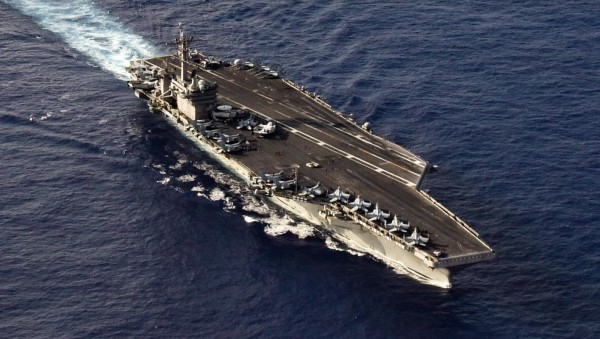

Senior members of the House Armed Services Committee called the firing of USS Theodore Roosevelt Capt. Brett Crozier on Thursday an “overreaction” by Navy leadership that would endanger service members, hurt the fleet’s ability to fight, and discourage other service members from speaking out on critical safety issues.
“[W]e are very concerned about the chilling effect this dismissal will have on commanders throughout the Department of Defense,” wrote committee Democrats, including Chairman Adam Smith (D-Wash.) and Subcommittee Chairs Joe Courtney (D-CT), John Garamendi (D-CA), and Jackie Speier (D-CA) in a press release.
“Dismissing a commanding officer for speaking out on issues critical to the safety of those under their command discourages others from raising similar concerns,” they said.
Crozier was relieved of command by Navy Secretary Thomas Modly on Thursday after the captain warned his superiors that his sailors would die of the novel coronavirus (COVID-19) unless most of the ship’s crew were placed in individual quarantine immediately.
The San Francisco Chronicle on Tuesday published a leaked copy of a memo from Crozier, in which the captain wrote that “if we do not act now, we are failing to properly take care of our most trusted asset—our sailors.”
Modly accused Crozier on Thursday of creating a panic on the ship and among the crew’s family members by sending his memo to too many people, though Modly did not outright accuse Crozier of leaking the memo to The Chronicle.
114 sailors aboard the Roosevelt have tested positive for COVID-19, Modly said, and the ship is now docked at Guam, where its sailors are gradually going into quarantine on the island. Modly said he anticipates hundreds more sailors will test positive for coronavirus.
The secretary said he felt Crozier showed “extremely poor judgment in the middle of a crisis” by sending his memo to between 20 and 30 people, which created doubts about the Theodore Roosevelt’s ability to deploy if needed.
House Democrats, however, disagreed with Modly’s assessment.
“While Captain Crozier clearly went outside the chain of command, his dismissal at this critical moment – as the Sailors aboard the U.S.S. Theodore Roosevelt are confronted with the COVID-19 pandemic – is a destabilizing move that will likely put our service members at greater risk and jeopardize our fleet’s readiness,” lawmakers wrote.
“Captain Crozier was justifiably concerned about the health and safety of his crew, but he did not handle the immense pressure appropriately. However, relieving him of his command is an overreaction,” they added.
The lawmakers expanded their critique to the DoD in general, admonishing Defense Secretary Mark Esper for telling individual commanders to decide how to handle the crisis themselves rather than issue clear guidance on how to handle it. That course of action forces commanders “to make decisions on matters outside of their expertise while under immense pressure,” the lawmakers wrote.
Rep. Seth Moulton (D-Mass.) also blasted Navy leadership for the decision to fire Crozier.
“I learned on my first day in the Marines that having the courage to speak truth to power is grounds for respect not grounds for relief,” Moulton tweeted on Thursday. “This is far from the first time in the last several years that Congress is going to have a lot of questions for Navy leadership—on leadership.”
Still, House Democrats emphasized taking care of sailors first, then sorting out wrongdoing.
“As the crew continues to grapple with this health crisis, the Navy should be focused first and foremost on the safety of our service members,” they wrote. “Once they are secured, there will be ample time to identify what went wrong and who is to blame.”